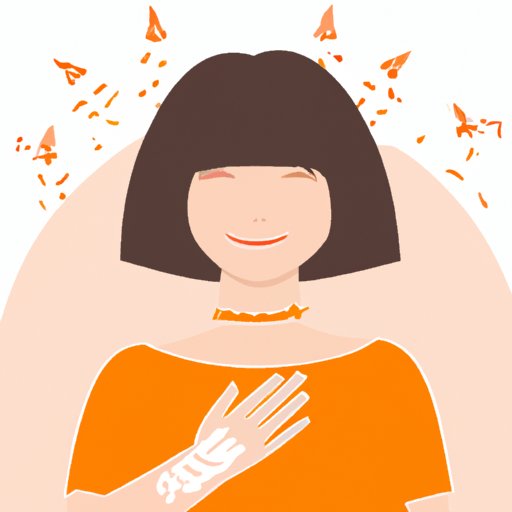
I. Introduction
It’s a distressing feeling when your chest feels tight and constricted due to anxiety. This physical symptom can add to the apprehension and panic one might already be feeling. Chest tightness from anxiety can occur in people of any age group and can be managed with the right care. This article outlines five effective ways to alleviate chest tightness from anxiety and promote relaxation.
II. Mindful Breathing Techniques
One of the ways to ease chest tightness is to regulate breathing patterns. Mindful breathing can be easily incorporated into daily life to relax and calm the mind. The technique involves inhaling and exhaling slowly, focusing on each breath. Prioritizing breathing in stressful situations can help one to control the physical response to stress and anxiety. To begin with, sit in a comfortable position or lie down, place a hand on the chest and breathe in deeply and slowly. Try to expand the chest and feel the breath in the nose. Pause for a moment and exhale slowly through the mouth, feeling the chest release. Repeat the process for five to ten minutes. Consistent practice can make it easier to calm oneself when anxious.
III. Yoga and Stretching
Yoga and stretching can be very supportive in easing chest tightness and helps to increase flexibility, strength and provide relaxation to the body. Many positions involve controlled breathing and movements, leaving the mind and body refreshed. A few poses specifically for relieving chest tightness are the cat and cow stretch and child’s pose. In cat-cow, get on the hands and knees, arch the spine while inhaling and round the spine while exhaling. Child’s pose is another simple position where the person sits on the heels with the hands stretched in front of them in a forward bend position. Hold each position for 5 to 10 breaths. Make sure to focus on the breath and move slowly to avoid any strains.
IV. Herbal Remedies
For those who are looking for a natural remedy and would like to avoid medication, there are various herbs that can help relieve anxiety. One such herb is chamomile, which is known for its calming effect on the mind and body. Another herb is lavender, which contains linalool, an organic compound that induces relaxation. One can consume herbs in various forms, such as a tea or supplement. While choosing an herbal remedy, consider discussing with a medical professional to avoid any potential side effects or contraindications.
V. Nurturing Self-Care
Self-care is essential in reducing stress, managing emotions, and promoting overall well-being. Practising self-care can be as simple as taking a break from work, listening to soothing music, taking a warm bath, or going for a walk. One can make a list of activities that recharge their batteries and prioritize them throughout the week. Taking time for oneself can reduce anxiety and promote a sense of accomplishment and relaxation.
VI. Seeking Professional Help
If chest tightness becomes severe or frequent, professional help may be required. Recognizing the signs of when anxiety may require intervention is essential. A mental health professional can help one to develop coping strategies and address underlying issues. Various therapeutic approaches such as cognitive-behavioural therapy, medication, and hypnosis/talk therapy can be effective in managing anxiety symptoms. When seeking professional help, one can reach out to their healthcare provider or consider using online resources to connect with a licensed mental health professional.
VII. Conclusion
Chest tightness caused by anxiety can be overwhelming, but it’s essential to know that it’s treatable with the right care and approach. Being mindful of breath, practicing yoga, using herbal remedies, prioritizing self-care, and seeking professional help can all play a significant role in reducing anxiety-associated chest tightness. Start by picking one or more steps and incorporating them into daily life. Remember, it’s vital to take care of mental health and reach out for help when needed.





